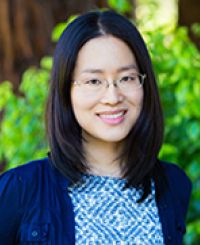Dr. Chung received a B.S. in Chemistry from Pohang University of Science and Technology (POSTECH), South Korea, in 1999. Her undergraduate research in Dr. Taeha Joo’s lab centered on ultrafast time-resolved spectroscopy. Dr. Chung then pursued graduate studies in Dr. Moungi Bawendi’s lab at the Massachusetts Institute of Technology. There she studied the photophysics of individual semiconductor nanocrystals (also known as quantum dots, or QD). Toward the end of her time at MIT, Dr. Chung became interested in how the power of single molecule level investigations might be exploited by the field of biology to better understand human diseases. This interest led Dr. Chung to join Dr. Ira Mellman’s lab at the Yale University School of Medicine, as a post-doctoral fellow after receiving her Ph.D. in 2004. She continued on with Dr. Mellman at Genentech when he accepted a position there as a Vice President of Research Oncology. During this time she developed QD-based single-molecule optical tracking methods and statistical analysis tools to investigate the diffusion dynamics of individual plasma membrane proteins. This work led to new understanding of how Epidermal Growth Factor receptors (EGFR) become activated.
In 2011, she became a Scientist (Principal Investigator position) in the Molecular Oncology Department at Genentech. In this role she led an independent research program using single molecule biophysical approaches to determine how cell surface receptors, such as HER family receptor tyrosine kinases (RTK), promote cancer progression and how current anti-RTK therapeutics inhibit this process. In 2015, she joined the Janelia Research Cancer/ HHMI as a Senior Scientist in the group of Dr. Jennifer Lippincott-Schwartz. At Janelia she built two super-resolution microscopes: a lattice light sheet microscope and a TIRF-structured illumination microscope, which were based on original designs of Drs. Eric Betzig and the late Mats Gustafsson. With these tools, Dr. Chung investigated the spatial regulation of autophagy, and assisted external collaborators in solving various cell biological problems with advanced imaging methods. In December 2017, Dr. Chung was appointed to the faculty of the George Washington University School of Medicine and Health Sciences as an Assistant Professor of Anatomy and Regenerative Biology.
View Dr. Chung's Lab Website
Research
Dr. Chung’s research focuses on discovering how morphological changes of cell membranes affect protein signaling and metastasis in cancer. She recently showed that receptor protein overexpression alone, in the absence of signaling activity, can deform cell membranes and dismantle cell contacts. This suggests the protein-lipid interaction at the cell membranes can play a key role in cancer cell dissemination during metastatic progression. Alterations of membrane structure and composition by the physical effects of protein overexpression challenge the current paradigm of the activity-malignancy relationship by invoking a biophysical mechanism. The current focus of the Chung lab is to elucidate the biophysical roles of cell membrane remodeling in cancer. To this end, we use cutting-edge biophysical techniques, including single molecule optical tracking, super-resolution microscopy, and novel statistical analyses, in conjunction with conventional biological tools in biochemistry, molecular & cell biology, and cancer biology, to characterize the cellular changes that contribute to metastatic progression. Single molecule approaches can reveal entirely new information about the intrinsic behavior of individual molecules and their interactions with the local environment. The Chung lab’s broad interdisciplinary expertise in physics, chemistry, and biology, advanced imaging tools, and experience in drug discovery and development within the biotechnology industry provide a strong foundation for an innovative research program.
